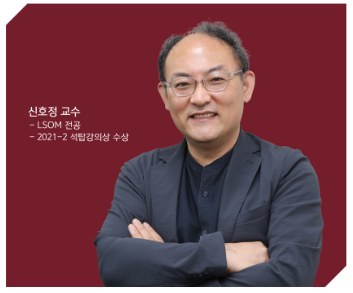News
KUBS News
[KUBS Teaching Committee] Let`s listen to the Winner of the Lecture Award!
2022.07.11 Views 3568 국제실
"Active intervention is necessary for education… I become a ‘Jolly Dictator.’"
In order to improve the overall quality of teachers' teaching skills and techniques and share good examples of teaching, KUBS has established "KUBS Teaching Committee" in 2021. The Teaching Law Committee runs several sessions, including △how does the professor in the next classroom teach? △ Hear it from the Lecture Award winner △Introduction to teaching techniques and is striving to provide teaching methods that meet the educational demand. In the , we would like to disclose some of the teaching methods of the KUBS professor through the " Let's listen to the winner of the Lecture Award!" session, and in the June issue, we share an interview with Professor Hojung Shin among the winners of the 2021-2 Seoktap Lecture Award.

Q1. Congratulations on winning the Seoktap Lecture Award for the second semester of 2021 [Operations Management]. Please briefly introduce the subject.
Companies use capital and labor to produce value. The study of the process of value production is 'Production Management'. Basically, it is a subject that deals with the process and system of implementing customer value in a system using capital and manpower.
Q2. What do you think the students liked about this class?
I think the first one is communication. Basically, I think education should be based on "human contact," so I think it was naturally revealed in class that I like people.
The second reason is that it was educated through 'active intervention'. If possible, we are trying to actively intervene and clearly instruct students in the direction that "this is right, this is not right." And I tend to teach all the contents on the syllabus. I tried to develop their ability to solve problems by adding appropriate "challenge" to guide students' potential instead. If you are a student at KUBS, I think it is important to instill that mindset because you are already qualified as a "game changer" or "game setter." I tried to create a class that mixes the appropriate ratio of challenge and the story of the world.
Q3. Those who are good at teaching like you must have some concerns. What are some things that didn't go well or that needed some improvement in this course?
Actually, it was difficult to communicate during online classes. I think it was more difficult because I was teaching English. So I spent a little more time after class, taking questions in Korean for 5-10 minutes. Also, before class, I used to access it about 5 minutes earlier and play various music for warm-up.
And since it's a non-face-to-face class, I have to look at the camera, but there were many times when I didn’t get to do that. So students would go, "Where are you, professor?" "Is there someone next to you?" (laughs) I like face-to-face classes much better, where you don't have to worry about the camera angle, because I can receive the energy from people directly.
Q4. What do you have in mind the most when you teach a lecture?
I think two things are important. It's "Clarity of Presentation" and "Fairness in Grading".
First, I think “clarity of presentation” is important in that the lecture should be clean and clear. I think visuals account for more than 35% of the lecture power, so I tend to pay a lot of attention to making teaching materials.
I also value 'fairness in grading'. I cover up the students' names and grade them only with scores, and I share the grading results with everyone. Rumor has it that I am one of most generous-grading professors in business school, but I also give out a lot of D and Fs. I run the class thinking that it is fair to give good grades to those who work hard and bad grades to those who don't. It may be unfortunate for students, but I'm a professor who can never negotiate on grades.
Q5. What is unique about your class?
I teach all the basic models in areas like strategic demand forecasting. Even without SAP programs, I teach them to know all the problems if they can add and subtract using Excel. I often meet students who used this data to report it and received compliments at companies, and I feel very proud at those times.
And in the case of exams, I make problems so that students who have studied hard will feel they are too easy, but too difficult to those who have not studied. My principle is to fill out one sheet of Cheating Sheet and bring it to the exam. I think organizing a sheet is much more helpful to study, and this method was also used by my Ph.D. teacher.
Q6. What is your general review of your lecture or your philosophy of education?
I'm a ‘Jolly Dictator.’ Basically, I think education should be a system in which one teacher teaches a majority, and as I said before, "active intervention" is necessary. I think I might be a typical "kkondae(Korean slang: someone who lectures others in a condescending way)" these days. However, because I enjoy and like to communicate, I think I may seem like a "jolly dictator."


